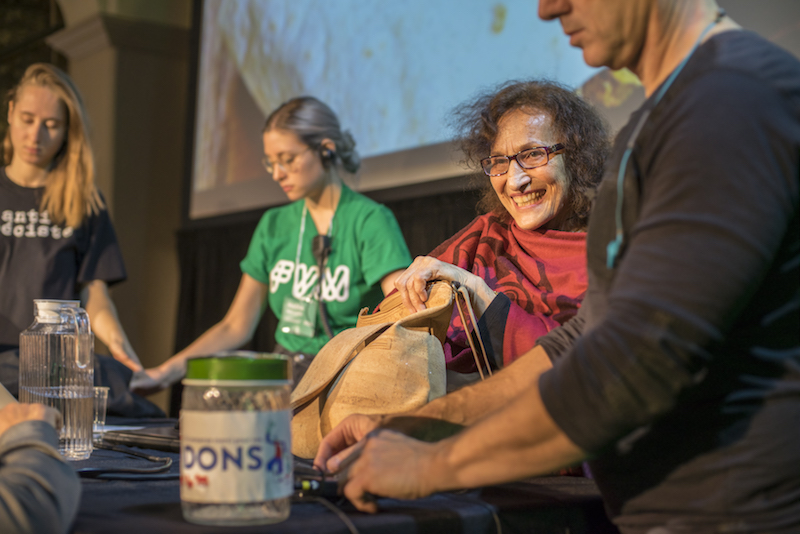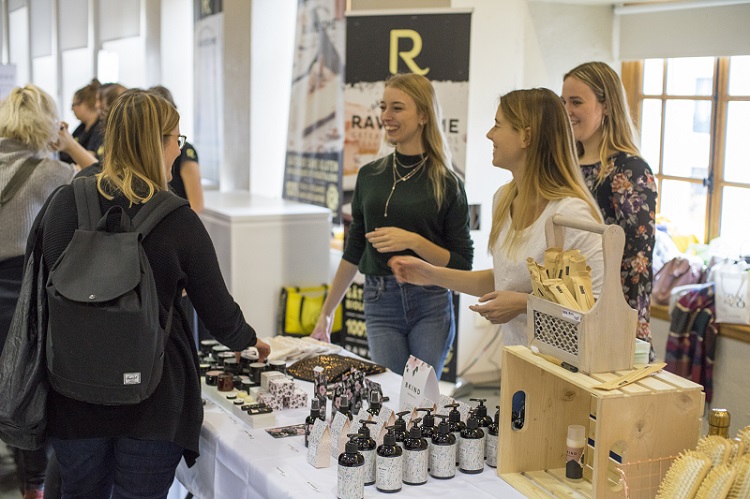The event’s fourth edition featured tastings, talks and culinary demonstrations
May contain eggs, milk, butter or gelatin are words that could not be found anywhere at Marché Bonsecours this weekend. Ingredients like soy, nuts, legumes and tofu, on the other hand, were readily available.
On Nov. 4 and 5, vegans from across the country gathered for the fourth edition of Montreal’s Vegan Festival. Conferences, culinary demonstrations, dégustations and over 30 stands introduced aspects of veganism to the public.
In the scenic Old Port, the market was packed to its maximum capacity throughout the weekend. A stage was set up on the lower level to host conferences and culinary demonstrations by vegan cooks, artists, athletes, philosophers, sociologists and bloggers. The upper level offered different options of vegan food, drinks, desserts, skincare products and clothing. Festival goers ranging from toddlers to seniors lined up for free samples of cheesecake or kombucha. Some tried on winter jackets or even got a vegan tattoo.

Among the many people hosting conferences at the festival, Antoine Jolicoeur Desroches, a professional triathlon athlete from Quebec, discussed the health and athletic performance benefits of a vegan diet. Three years ago, Jolicoeur Desroches made the decision to become a vegan after seven years as a vegetarian. “I had always been careful with my impact on the environment, but I had never thought of the impact my eating habits could have,” he said. For Jolicoeur Desroches, his ethics toward the environment were far more important than the effect this new diet could have on his body and practice. Nonetheless, the results were positive and noticeable. “My performance increased. It became easier to recover, and I became able to use all the energy my body was uselessly spending to digest animal products,” he said.
He advised young athletes to make the transition slowly, adding days or meals throughout the week that eliminate animal-based products, such as “meatless Monday.”
“[Veganism] is a lifestyle that must be established for a lifetime through progressive change,” Jolicoeur Desroches said. He added that traveling for competitions has not hindered his eating habits. “There are always local products like fruits, vegetables, pasta, potatoes or rice. Also, having a set of spices is good to diversify seasoning,” he said.
Seasoning is big part of Sam Turnbull’s daily life. The Concordia alumna and author of the blog “It doesn’t taste like chicken” attended the festival to discuss her new book, Fuss-free Vegan, about vegan comfort food.
Unlike Jolicoeur Desroches, Turnbull made the full transition overnight five years ago after watching a documentary on animal cruelty. Growing up in a family of chefs, butchers and hunters, Turnbull loved cheese and meat. “When I made the switch, it is because I knew I should, not because all of a sudden I was obsessed with vegan food,” Turnbull said. “At first, I started looking up vegan recipes, but it was all kale, quinoa and energy bars. So I started my blog because I don’t eat that way,” she said. Turnbull’s blog is unique, as it features recipes focusing mainly on comfort food like pizza, burgers, sandwiches and dessert—foods that people don’t usually associate with veganism.
“It is all with easy-to-find ingredients at local grocery stores, not weird powders or maca root,” Turnbull said with a laugh. She encourages students to follow a vegan lifestyle since foods like cheese and meat can be expensive compared to fruits and vegetables. And diversity in taste is easily achievable using spices. “You can make a delicious meal with beans and rice as long as you have the right spices in it,” Turnbull said.

Beans are also the solution for Vesanto Melina, a dietician and lead author of the book The Academy of Nutrition and Dietetics. Beans represent a source of vegetable protein often forgotten, according to Melina. She was a vegetarian for more than two decades before making the transition to veganism 24 years ago. As a dietician, Melina discussed the dos and don’ts of a vegan diet, but also how to get all the nutrients your body needs.
Learning to add beans, peas and lentils to your recipes as well as acquiring non-dairy sources of calcium in your diet is often forgotten. “Once people have those knacks and they make sure to take vitamin B12, things move along really well,” Melina said. Vitamin B12 is an important nutrient that comes from bacteria often present in meat products.
“Vegans don’t lack nutrients more than anybody else,” Melina said. She emphasised that anybody is at risk of malnutrition in Canada—especially those who lack vitamin D during the long winters. “It is easy to find vegetal proteins or calcium that are more efficient than animal ones,” Melina said.
Photos by Elisa Barbier




